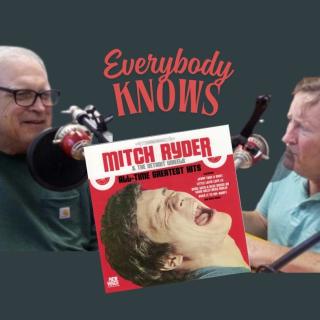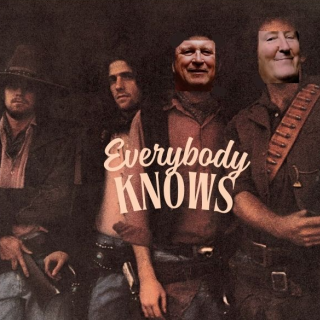Advertisement
Thanks to a southern mother and time spent as a boy growing up in the heart of Dixie, I have a devotion to the region. This, I think, helped me understand the fertile cultural and emotional soil from which the rock 'n' roll and soul music revolutions sprang. Maybe, maybe not. But I like to think so. Southerners are not like Northerners.
Margaret Yates was born beautiful, stayed that way her whole life and had a whole lotta soul if not a whole lotta education. Second eldest of 11 kids, she grew up in Richmond, Virginia, during the Great Depression, dirt-poor and left-handed, two things the tender mercies shown by the Catholic nuns never changed though they left painful memories from the trying.
But that part, as they say, is another story. I was my mother's son.
We moved around the country a few times. Dad was an up-and-coming steel company manager frequently promoted and transferred. Which is how I came to live in northern Alabama for a few precious boyhood years, Gadsden, to be exact.
We were pegged for civil rights workers at first, it being the early '60s and with Ohio license plates on our '63 blue Mercury. The first day after school at Eura Brown kids threw dirt clods on the street in front of the car to express their rebel disdain for us Yankee carpetbaggers. Strangely, I didn't take it personally. I was already used to hostility from a new neighborhood.
Once I explained to 'em during recess the next day I hated black people as much as they did, they relaxed a bit. I didn't of course, but I wanted to play kickball. I was in. Whatever. I was seven years old and navigating my way through the churning changing waters of the Deep South--though I didn't know it at the time, obviously.
What did give me fright was having to participate in early morning Bible readings. No one asked. It was just expected of you. Surely Yankee Boy read the Good Book up there in Cleveland.
But I'd never read the Bible, I knew no favorite psalms. When it came my turn as it did to one us every morning in Mrs. Sharpe's second grade class, I was prepared though scared someone would find out my family held no respect for religion, God, the Bible and especially its thumpers. Growing up in a house where God's last name was Damn, no one prepared me for this, an elementary school religious fraud.
Come my turn, I just read what Billy Abbott had a couple weeks earlier, a psalm about sheep or something, he being at the beginning of the alphabet and me being two-thirds. No one noticed and I closed my eyes solemnly at the end of the short paragraph. Without a hitch, I was accepted again.
It got easier as the school year wore on. And I've never held this against those fine southern people. Because frankly, the more my family got to know Alabamians, the more we liked 'em. None of them cussed. None of them used the 'n' word (my father did). Few of them drank. Everybody went to church. Genteel to the max. And eventually we did consider them fine people. And became quite fond of them.
The men were soft-spoken and gentle; the women were proper but kind, sincerely kind. The little rituals breaking us in aside, they really did want to show us southern hospitality.
It's the only place in the entire world I saw this: when Mrs. Geiger picked us and her kids up after school, she'd say hi to every passing car coming her way. No, really. A smile and kind of a breathy, "Hah.” I was fascinated.
So I was seven, figuring out how to survive in this strange, humid place, in a school which had no library, only a handful of books on southern heroes printed in the 1920s languishing on one of two shelves next to my desk. Andrew Jackson, Jim Bowie, Davy Crockett and J.E.B. Stuart became my heroes. I hated what happened at the Alamo.
But for me, growing up with a woods, a creek and a mountain behind our house was a dream come true. In the northern 'bama pine forest there was freedom--no adult supervision, just tree houses, forts, pine cone battles and perfecting our rebel yells were the order of the day.
The weather was decent year-round and mum's plants started blooming in February. Pa and I hunted arrowheads on the weekends with his work colleagues, nearly all ex-WWII vets--a couple Normandy paratroopers and a couple Pacific Marines. I was in the company of giants, walking cotton, tobacco and corn fields looking for Cherokee and Creek Indian artifacts and finding them, bags of 'em, while hearing war stories fighting the Nazis and Japs. I was in heaven. Southern men make great soldiers.
We hunted arrowheads on high ground near rivers, from George to Mississippi, through Alabama and southern Tennessee. You will never meet a white boy whose walked more cotton fields than I. I saw sharecroppers and snakes, poverty and mansions. I fired pistols on lunch breaks and saw more backwoods southern country than Sherman, a previous Yankee interloper.
I was sad to leave my tree house and friends, the sweet soft smell of southern pine forests.
When I started getting serious about music, I eventually realized Elvis couldn't've come from Cleveland; Booker T. and the MG's could only have happened in Memphis; Hank Williams Sr. had to start out in Butler County, Alabama, and then meet Rufus Payne, a black street performer in Georgiana who became perhaps his biggest influence. And of course the re-channeled Southern Baptist hell fire of Jerry Lee Lewis. Southern men are passionate, their primal emotions close to the surface, like the immortal and magnificent Johnny Cash.
Once, many years ago, I was interviewing Carl Perkins by telephone and was having such a good, emotional talk about life he began to cry--about his mama, about his life, about his fortune. It wasn't Jimmy Swaggart tele-tears. It was real.
A few years ago I rode a motorcycle straight from Columbus to Gadsden, 675 miles in a day. It was a Saturday. I stayed at a motel near the Coosa River, sight of a small Civil War battle, a war that was fresh in southern minds back in '63. Next morning, I casually rode around town, trying to remember the lay of the land. I was turning around in a tidy little un-sidewalked neighborhood off the main drag when I came upon a sight unthinkable when I was a boy: a black city police woman ticketing a white cracker in his pick-up truck, with back-up provided by two other white cops.
I remembered the city pool which cost a dime to swim in being closed because the city refused to integrate.
Anyway, I believe southern blood and spirit made the rock 'n' roll revolution entirely possible. Because for one thing, the south is poor and poverty is a great equalizer between the races. I just don't feel the tension down there that I do here. Blacks and whites, I believe, get along better now down there than they ever have up here.
I've more than once been the lone Yankee voice battling verbally with entire dinner parties filled with uppity pointed-headed liberals sure of their assumed knowledge the south is a lost and hateful place, still full of Bull Connors and strange fruit trees, convinced that to sound southern is to sound stupid. I even met a woman so arrogant she simply couldn't believe there were seven synagogues in the southern Appalacia. "A Jew in the Appalachians?" she puffed. "Whoever heard of such a thing?"
Well, one was Adolph Ochs, who traveled from Chattanooga to New York City in 1886 to buy a newspaper called the New York Times, the bible for every pointy-headed liberal. "Who ever heard of a JEW riding a horse?" spat the venomous mother to Tony Soprano in the episode where Hesh the Jewish bookie was used as a pawn between Tony and Uncle Junior.
By the way, during my years as a rock critic I took my mother with me to see Pink Floyd, Diana Ross, the Rat Pack and Sting. One of my last memories of her was watching Mick Jagger performing on TV from one of his lame solo albums. He was still great and she still got a kick out of him. She was 74 and a gas.
My unscientifically derived point to this column: southerners are different. They got more soul than most northern white folk and American music has been the better for it. Much, much the better.



